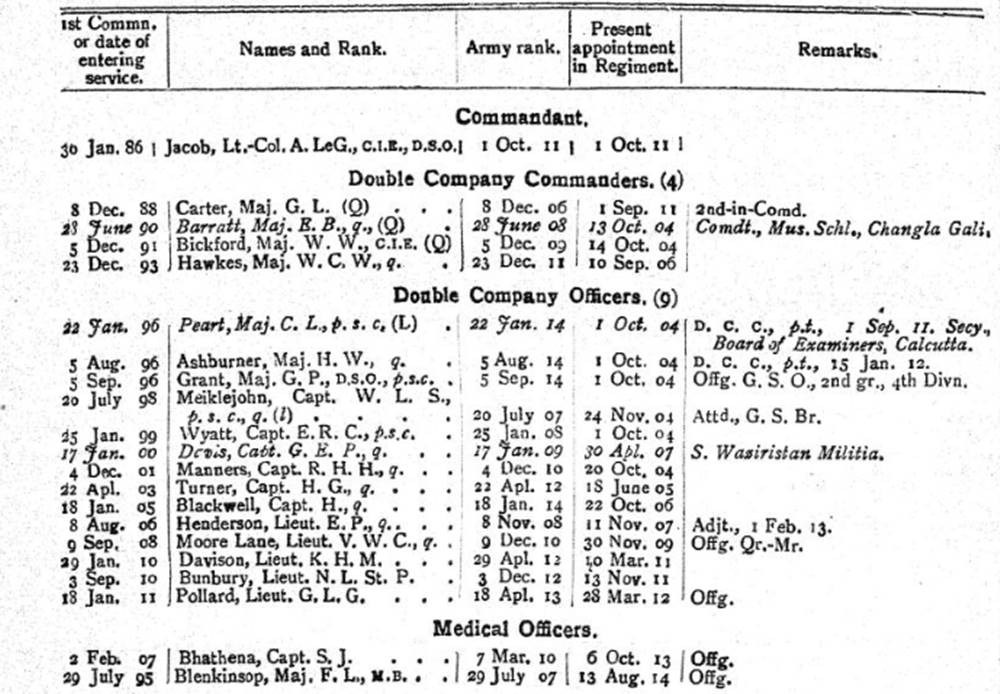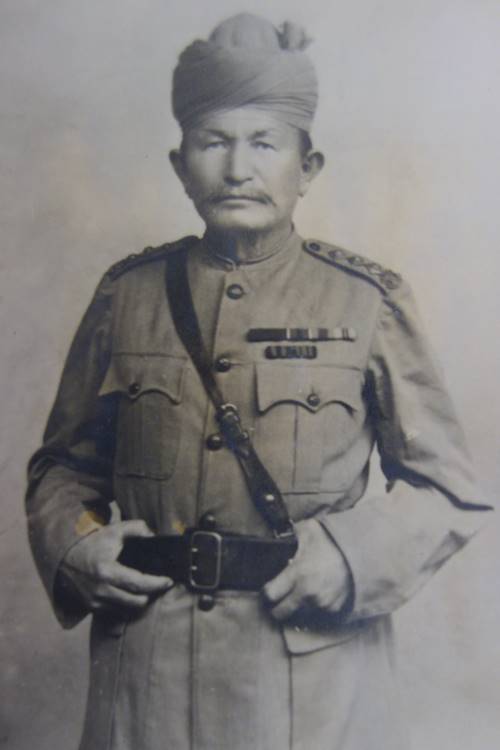This article will provide you with an overview of the history of the 106th Hazara Pioneers during the First World War and help you research those who served with the Regiment. I have also written a series of guides to help you research those who served in the Indian Army during the war. To view these guides, click on the link below:
The 106th Hazara Pioneers in the First World War
Lineage: Raised by Major Claud William Jacob at Quetta in 1904 from a nucleus of drafts from the 124th Duchess of Connaught’s Own Baluchistan Infantry and 126th Baluchistan Infantry and became the 4th Hazara Pioneers in 1922. The Regiment was disbanded in March 1933.
Composition in 1914: 8 Companies Hazaras. 1919: 4 Companies of Hazaras.
Location in July 1914: The 106th Hazara Pioneers was stationed at Quetta (Balochistan, Pakistan) where it had arrived from Sibi (Balochistan, Pakistan) on 3rd April 1906.
The 106th Hazra Pioneers was a unique regiment of the Indian Army as it was recruited solely from Hazaras, who came from what is now Pakistan, Afghanistan and Iran. Prior to the formation of the Regiment in 1904, Hazaras were only recruited in small numbers in the Indian Army, primarily for the 124th Duchess of Connaught’s Own Baluchistan Infantry and 126th Baluchistan Infantry. The British officers were specially chosen for the new Regiment based on their ability, with its first commanding officer, Major Claud William Jacob, later becoming a Field Marshal. The most important source of information for the Regiment in the pre-war period is its confidential reports held at the British Library, with its first for 1904-05 transcribed in full below:
By Major-General Horace Lockwood Smith-Dorrien, Commanding 4th (Quetta) Division. 13 March 1905
Personnel: Very satisfactory. A fine body of men. All ranks keen and energetic. British officers are picked men.
Drill and Instruction: Training is progressing satisfactorily. Somewhat handicapped as the Arsenal have been unable to supply fighting and Pioneer equipment. I am enquiring into this matter.
Interior Economy: Satisfactory.
Discipline: Satisfactory.
Musketry: No remarks.
General Condition: A Battalion of recruits. Lieutenant-Colonel Jacob and his officers are to be congratulated on the progress made.
Remarks by Lieutenant-General Archibald Hunter, Commanding Western Command. 11 April 1905.
The General Officer Commanding 4th Division reports that he is satisfied with the progress made in the 106th Hazra Pioneers. I am glad to receive this report. It must not be forgotten that other Regiments have been denuded of their best officers and non-commissioned officers to furnish this Battalion with their complement, and that, therefore, an exceptionally high degree of efficiency at a very early date is not only to be expected, but is demanded. Action taken on all points requiring it.
Collection 405/7: Confidential reports on inspection of regiments, British officers, etc. for 1905-06: IOR/L/MIL/7/17013.
The Regiment had an uneventful ten years prior to the outbreak of war, serving first at Sibi and then Quetta, where the unit was still located when the First World War began in August 1914. The 106th Hazara Pioneers was serving as part of the 2nd Quetta Infantry Brigade in the 4th (Quetta) Division, on the outbreak of war. Though the Regiment remained in India until 1918, a draft was sent to the 107th Pioneers which was serving on the Western Front in which arrived around May 1915. This draft remained with the 107th Pioneers until late 1916 when the Regiment returned to India after serving in the Mesopotamia Campaign. In 1916, the 106th Pioneers was split between Seistan (Sistan, Balochistan, Pakistan) and the Kelat Territory before it returned to Quetta. The extract below was taken from the October 1914 Indian Army List and recorded the British officers serving with the Regiment.
The 106th Hazara Pioneers was present in Mesopotamia during the Iraq Revolt of 1920 and qualified for the General Service Medal with Iraq Clasp. Surviving Medal Index Cards for the General Service Medal with Iraq Clasp can be viewed on either Ancestry (for free) or the National Archives’ website.
War Diary of the 106th Hazara Pioneers:
There is only one war diary of the 106th Hazara Pioneers which has been digitized by the National Archives. To download the war diary for a small fee click on the blue link below.
- Date: 15 February 1918 – 30 April 1920
- 18th Indian Division, Mesopotamia
- Reference: WO 95/5222/8
- Notes: An average war diary at best which is typical for a pioneer unit. The war diary includes the regimental numbers of Indian soldiers invalided from the 106th Hazara Pioneers during March and April 1918. British officers are frequently mentioned throughout. The only appendices are nominal rolls of British officers serving with the 106th Hazara Pioneers each month between March 1918 and April 1920.
Further Sources for the 106th Hazara Pioneers
One of the best sources for information concerning the 106th Hazara Pioneers and in particular for the British officers serving with it is the Regiment’s confidential reports held at the British Library: Confidential Reports on Regiments etc. These reports also contain the annual confidential reports of the British officers serving with the Regiment, though when it is abroad only those serving with the Depot are reported. For information concerning British and Indian officers who served with the 106th Hazara Pioneers, the Indian Army List can be consulted. Surviving Medal Index Cards for the General Service Medal with Iraq Clasp can be viewed on either Ancestry (for free) or the National Archives’ website.
There is a short regimental history: A Brief History of the 106th Hazara Pioneers by Brigadier-General B. L. St. Pierre Bunbury. This is a very rare book which covers the period between 1904 and 1933. The book is only 25 pages in length and touches upon the enlistment of Baltis into the Hazara Pioneers. There is also a short account of two British officers coming across Hazaras fighting with the White Russians during the Russian Civil War. I viewed a copy of the book at the British Library which had a photograph (shown below) of Hon. Captain Dost Muhammad OBI IDSM, Subadar-Major of the Regiment between 1904 and 1917 glued in.
Extracts from War Diary of the 106th Hazara Pioneers
15 February 1918 – 30 April 1920, Mesopotamia, WO 95/5222/8
15 February 1918 – Jhatpat – Telegram No.2577 Concentration received ordering move of Regiment from Jhatpat to Kiamari on 21st and 24th February respectively.
27 February 1918 – Basrah – 3 pm – Arrive at Basrah (No.5 Berth Margil) and disembark and march to Makina Camp (No.3 Indian Base Depot) arriving in camp at 8 pm. All camps and ground very wet and muddy owing to recent heavy rain.
19 April 1918 – Akab – Brick making and building work Akab, Cook Baksh [the CWGC gives Baksh’s death as the 18 April 1918. It is not unusual to find Indian drowning victims date of death being given for the date their body was recovered rather than when they went missing] reported absent on 2 April 1918 found drowned near Baghdad.
1 July 1918 – Table Mountain – Strength of unit in Field (actually present) British Officers: 7. Indian Officers: 21. Indian Other Ranks: 1010. Followers: 53.
25-26 February 1919 – Baiji – Regiment halted at Baiji. Orders received for Headquarters and two companies to proceed to Balalij on motor lorries for work on roads, remaining two companies to remain at Baiji and cross river on completion of bridge for work on Butmal-Altun Kupri road.

